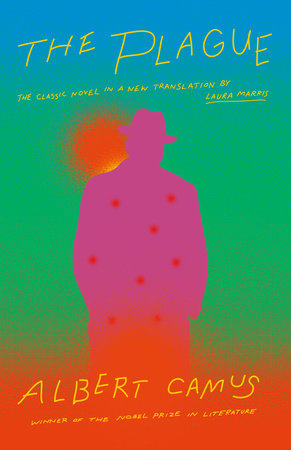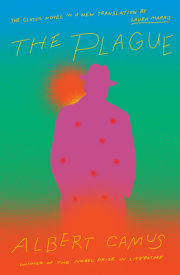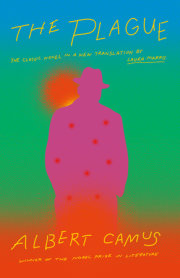PART ONE
The curious events that make up this chronicle occurred in 194_, in Oran. By all accounts, they had no place there, being a bit out of the ordinary. At first glance, Oran is, in fact, an ordinary town and nothing more than a French prefecture on the Algerian coast.
The city itself is undeniably ugly. Through the outward calm, it can take some time to notice what sets this commercial city apart from so many others along every latitude. How to picture, for example, a city without pigeons, without trees and gardens, where you encounter neither the beating of wings nor the rustling of leaves, in short, a neutral space? The changing seasons are only visible in the sky. Spring announces itself by the quality of the air or by the baskets of flowers the peddlers bring from the surrounding areas; this spring is hawked at market. In summer, the sun scorches the toodry houses and covers the walls with gray ash; then you can only survive in the shade of closed shutters. In fall, it’s the opposite, a deluge of mud. The fine days come only in winter.
One useful way to get to know a city is to find out how people work there, how they love there, and how they die there. In our little city, perhaps because of the climate, all these things are done together, with the same frenetic and absent attitude. In other words, people here get bored and concentrate on developing their habits. Our fellow citizens work hard, but always to make themselves richer. Above all, they are interested in trade and their first concern, in some form or other, is to do business. Naturally, they also have a taste for simple pleasures: they love women, the movies, and swimming in the sea. But very sensibly, they save these pleasures for Saturday night and Sunday, trying, on other days, to make a lot of money. In the evening, when they leave their offices, they meet up in the cafés at the same hour, they stroll on the same boulevards, or they sit out on the balconies. The desires of the youngest are violent and short, while the vices of the eldest don’t surpass bocce ball leagues, charity banquets, and clubs where people risk high stakes on their luck at cards.
You might say this isn’t specific to our city and that in general all of our contemporaries are like that. Of course, nothing is more natural these days than to see people work morning till night before choosing to waste, at cards, in cafés, or in small talk, what time they have left to live. But there are some cities and countries where, from time to time, people get a hint of something more. Usually, it doesn’t change their lives. There is only the hint, but at least it’s a start. Oran, on the other hand, is apparently a city without hints, which is to say, a completely modern city. As a result, there’s no need to specify the way we love around here. Men and women either devour each other quickly in the socalled act of love, or they engage in a long, two-person habit. Between these extremes, there is often no middle ground. That’s also not very original. In Oran as in many places, without time and reflection, people have no choice but to love each other without knowing it.
What’s most original about our city is how difficult it can be to die there. Difficulty, though, isn’t exactly right, and it would be better to talk about discomfort. It’s never pleasant to be sick, but there are cities and countries that support you in your sickness, where, in some fashion, you can let yourself go. A sick person needs softness, he likes to lean on something, that’s only natural. But in Oran, the excesses of the climate, the rate of doing business, the facile ornament, the quickness of dusk and the characteristic pleasures—these all demand good health. A patient finds himself quite alone. Think of the person who is dying, caught in the trap of a hundred walls sizzling in the heat, while at the same minute, a whole population is on the telephone or in cafés, talking about bank drafts, bills of lading, or discounts. You understand what might be uncomfortable about death, even modern death, when it arises in such a dry place.
These few indications are perhaps enough to give some idea of our city. Even so, it’s better not to exaggerate. What should really be stressed is the banal side of the city and of life. But as soon as there are habits, the days become easy. As long as our city favors its habits, you might say everything is for the best. Of course, from this angle, life isn’t very interesting. At least we don’t have any disorder here at home. And our frank, kind, active population has always provoked a modest admiration from travelers. This city without charm, without greenery, without a soul, seems restful in the end, at last it puts you to sleep. It’s only fair to add that the city is grafted onto an exceptional landscape, in the middle of a naked plateau, surrounded by luminous hills, on a perfectly drawn harbor. It’s just regrettable that the city was built with its back turned to this bay, and as a result, it is impossible to glimpse the sea, and you always have to go looking for it.
At this point, it’s easy to admit that our fellow citizens could never have dreamed of the incidents that took place in the spring of that year, incidents that were, as we would come to understand, the first signs of a series of grim events whose chronicle we have set out to write. These facts will seem quite natural to some, while others may find them implausible. But after all, a chronicler can’t be bothered by these contradictions. His task is simply to say, “This happened,” once he knows that this did, in fact, happen, that it mattered to the lives of a whole population, and that there are, as a result, thousands of witnesses who will assess, in their hearts, the truth of what he says.
As for the narrator, whom you’ll meet in due course, he would never have tried to put himself forward for this kind of undertaking if chance had not given him the opportunity to collect a certain number of accounts and if the force of things hadn’t gotten him mixed up in all he presumes to relate. That’s what authorized him to take on the historian’s task. Of course, even if he’s an amateur, a historian always has sources. The narrator of this story therefore has his own: first of all what he witnessed, then what others witnessed, since, through his role, he ended up collecting the secrets of everyone involved in this chronicle, and last, the texts which finally fell into his hands. He plans to draw on them when the time seems right and to use them as he likes. He also plans to . . . But perhaps it’s time to drop the commentary and precautions of language and get down to the narrative itself. Explaining the first days requires a few details.
Copyright © 2021 by Albert Camus. All rights reserved. No part of this excerpt may be reproduced or reprinted without permission in writing from the publisher.









